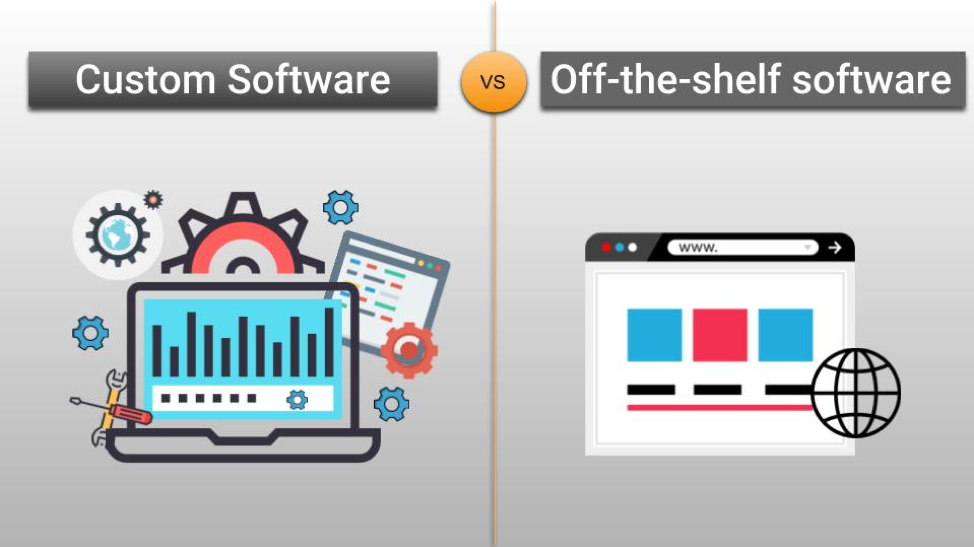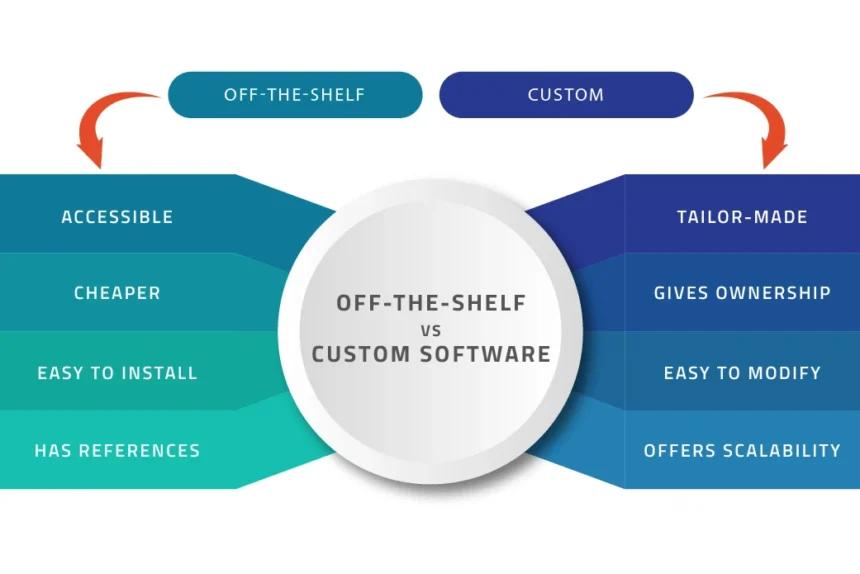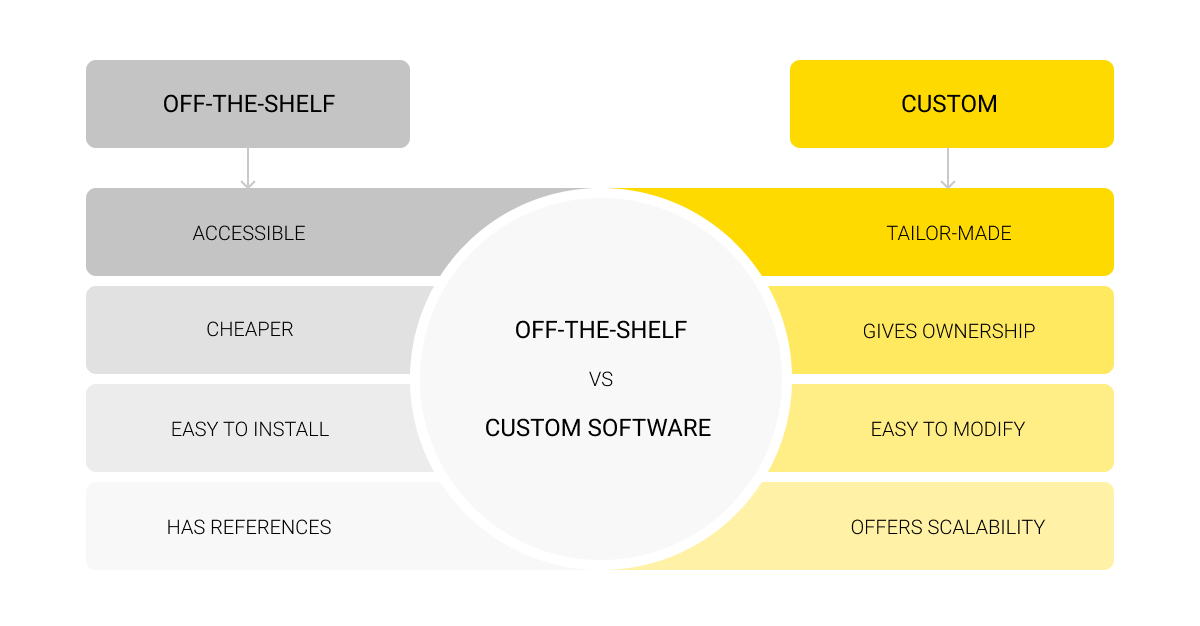When it comes to building an online store, one of the biggest decisions you’ll face is whether to go with an off-the-shelf ecommerce platform or build a custom solution from scratch. Both options have their pros and cons, and the best choice depends on your specific needs, budget, and goals.
In this comprehensive blog post, we’ll dive deep into the world of ecommerce platforms and help you determine which route is the best fit for your business. We’ll cover the key differences between off-the-shelf and custom solutions, provide real-world examples, and even throw in some cheatsheets and statistics to help you make an informed decision.
So, let’s get started!

Off-the-Shelf Ecommerce Platforms: The Quick and Easy Option
Off-the-shelf ecommerce platforms are pre-built solutions that you can quickly set up and start using right away. They’re like a ready-to-assemble piece of furniture – all the parts are there, you just need to put them together. Some of the most popular off-the-shelf platforms include:
- Shopify
- WooCommerce
- BigCommerce
- Magento Open Source
- Squarespace
The main advantages of using an off-the-shelf platform are:
Quick and Easy Setup
You can get your online store up and running in no time, without the need for extensive development work. This is particularly appealing for small businesses or entrepreneurs who want to start selling online quickly without the hassle of building a website from scratch.
Lower Upfront Costs
Off-the-shelf platforms are generally more affordable, as the development costs are shared among multiple users. This makes them a more accessible option for businesses with limited budgets.
Built-in Features and Functionality
Most off-the-shelf platforms come with a wide range of features and tools to help you manage your online store, such as inventory management, payment processing, and reporting. This can save you the time and effort of having to build these features yourself.
Robust Support and Community
Off-the-shelf platforms often have large user communities and provide support resources, such as documentation, forums, and tutorials. This can be invaluable when you’re setting up and maintaining your online store.
However, off-the-shelf platforms also have some drawbacks:
Limited Customization
While you can still customize the look and feel of your store, you’re generally limited to the features and functionality provided by the platform. This can be a problem if you have unique requirements or want to stand out from the competition.
Potential for Vendor Lock-in
If you decide to switch platforms down the line, it can be a complex and costly process. This can make you dependent on the platform provider and limit your flexibility.
Security and Maintenance
You’ll need to rely on the platform provider for security updates and maintenance, which can be a concern if they don’t have a strong track record. This can also limit your control over the security and performance of your online store.
Custom Ecommerce Platforms: The Tailored Solution
Custom ecommerce platforms are built from scratch to meet the specific needs of a business. They’re like a made-to-measure suit – every detail is customized to fit you perfectly. Building a custom platform requires a significant investment of time and resources, but it can be worth it if you have unique requirements or want to stand out from the competition.
Some key advantages of custom ecommerce platforms include:
Unlimited Customization
With a custom platform, you can create a unique user experience, implement specific business rules, and integrate with existing systems. This allows you to differentiate your brand and offer a shopping experience that’s tailored to your customers’ needs.
Scalability and Flexibility
Custom platforms are designed to grow with your business, allowing you to add new features and functionality as your needs evolve. This can be particularly important for rapidly growing companies or those with complex requirements.
Competitive Advantage
A well-designed custom platform can help you differentiate your brand and offer a unique shopping experience to your customers. This can be a significant advantage in a crowded ecommerce landscape.
Full Control
When you own your ecommerce platform, you have complete control over its development, maintenance, and future direction. This can be especially valuable if you have specific security or compliance requirements.
On the downside, custom ecommerce platforms have:
Higher Upfront Costs
Building a custom platform requires a significant investment in development, which can be a barrier for some businesses. This upfront cost can be a deterrent, especially for smaller companies with limited budgets.
Longer Development Timelines
Custom development takes time, and you may need to wait several months before your platform is ready to launch. This can be a challenge if you need to get your online store up and running quickly.
Ongoing Maintenance
Maintaining a custom platform requires a dedicated team of developers, which can be costly and time-consuming. This ongoing investment can be a concern for businesses with limited technical resources.
Comparing Off-the-Shelf and Custom Ecommerce Platforms
To help you visualize the differences between off-the-shelf and custom ecommerce platforms, here’s a table comparing their key features:
| Feature | Off-the-Shelf | Custom |
|---|---|---|
| Upfront costs | Lower | Higher |
| Development time | Faster | Slower |
| Customization | Limited | Unlimited |
| Scalability | Depends on platform | Highly scalable |
| Maintenance | Platform provider | In-house team |
| Integration | Limited | Seamless |
| Competitive advantage | Lower | Higher |
| Vendor lock-in | Higher | Lower |
Cheatsheet: Factors to Consider When Choosing an Ecommerce Platform
When deciding between an off-the-shelf or custom ecommerce platform, consider the following factors:
- Budget: How much are you willing to invest in your ecommerce platform? Off-the-shelf platforms are generally more affordable, while custom solutions require a larger upfront investment.
- Timeline: Do you need to launch your online store quickly, or do you have the time to invest in a custom solution? Off-the-shelf platforms can be set up in a matter of days or weeks, while custom development can take several months.
- Customization needs: How unique are your requirements? If you have specific business rules, integrations, or a strong brand identity, a custom platform may be the better choice.
- Scalability: Do you expect your business to grow rapidly in the future? Custom platforms are designed to scale with your needs, while off-the-shelf platforms may have limitations.
- Technical expertise: Do you have an in-house team of developers who can maintain and update your ecommerce platform? Custom platforms require ongoing support, while off-the-shelf platforms often have built-in support resources.
- Security and compliance: How important is it for your platform to be secure and compliant with industry regulations? Custom platforms allow you to implement robust security measures, while off-the-shelf platforms rely on the provider’s security standards.
- User experience: What kind of shopping experience do you want to offer your customers? Custom platforms can be tailored to provide a unique and engaging user experience, while off-the-shelf platforms may have more generic interfaces.
- Future-proofing: How important is it for your platform to be able to adapt to changing market conditions and technological advancements? Custom platforms can be more easily updated and expanded, while off-the-shelf platforms may have more limited flexibility.
- Integrations: Do you need to integrate your ecommerce platform with other business systems, such as accounting software or CRM tools? Custom platforms can be more easily integrated, while off-the-shelf platforms may have limited integration capabilities.
- Branding and identity: How important is it for your ecommerce platform to reflect your brand’s unique identity and values? Custom platforms allow for a higher degree of branding and personalization, while off-the-shelf platforms may have more generic branding options.
Statistics: The State of Ecommerce Platforms in 2023
To give you a better understanding of the ecommerce platform landscape, here are some key statistics:
- Shopify is the most popular ecommerce platform, powering over 1.7 million online stores worldwide.
- WooCommerce, a WordPress plugin, is the second most popular ecommerce platform, with over 3.8 million active installations.
- Magento Open Source is the third most popular platform, with over 250,000 active installations.
- Custom ecommerce platforms are more common among large enterprises, with 60% of businesses with over 1,000 employees using a custom solution.
- The global ecommerce market is expected to reach $6.54 trillion by 2023, growing at a CAGR of 14.7% from 2018 to 2023.
- Mobile commerce is on the rise, with over 72% of ecommerce sales expected to come from mobile devices by 2025.
- Personalization is a key trend in ecommerce, with 80% of consumers more likely to make a purchase from a brand that provides personalized experiences.
- Omnichannel strategies are becoming increasingly important, with 73% of consumers using multiple channels during their shopping journey.
- Sustainability is a growing concern for consumers, with 73% of shoppers considering a brand’s environmental impact when making purchasing decisions.
- Cross-border ecommerce is also on the rise, with the global cross-border ecommerce market expected to reach $4.8 trillion by 2026.
Real-World Examples: Off-the-Shelf and Custom Ecommerce Platforms in Action
To illustrate the differences between off-the-shelf and custom ecommerce platforms, let’s look at some real-world examples:
Off-the-Shelf Example: Beardbrand
Beardbrand is an online retailer that sells beard care products and accessories. They use Shopify as their ecommerce platform, which allows them to quickly set up and manage their online store.
Beardbrand has customized their Shopify store with a unique theme and branding, but they’re limited to the features and functionality provided by the platform.
One of the key benefits Beardbrand has experienced with Shopify is the ease of use and the ability to quickly launch their online store. As a small business, they didn’t have the resources or technical expertise to build a custom platform from scratch. Shopify’s pre-built features, such as inventory management, payment processing, and reporting, have allowed them to focus on growing their business rather than managing the technical aspects of their ecommerce platform.
However, Beardbrand has also faced some limitations with Shopify. For example, they’ve had to work within the platform’s design constraints and have been unable to implement certain custom features or integrations that could have enhanced the customer experience. This has forced them to find creative workarounds or compromise on some of their desired functionality.
Custom Example: Bonobos
Bonobos is an online clothing retailer that offers a unique shopping experience. They use a custom ecommerce platform that allows them to implement specific business rules, such as personalized sizing recommendations and a unique checkout process. Bonobos’ custom platform also integrates seamlessly with their in-store experience, providing a cohesive omnichannel experience for their customers.
By building a custom ecommerce platform, Bonobos has been able to create a highly differentiated shopping experience that sets them apart from their competitors. Their platform is tailored to their specific business needs, allowing them to offer features and functionality that are not available on off-the-shelf platforms.
For example, Bonobos’ custom platform integrates with their in-store “Guideshops,” where customers can try on clothes and have them shipped directly to their homes. This seamless omnichannel experience is a key part of Bonobos’ brand and customer value proposition, and would have been difficult to achieve with a generic off-the-shelf platform.
The downside of Bonobos’ custom platform is the significant upfront investment and ongoing maintenance required. Building and maintaining a custom ecommerce solution requires a dedicated team of developers and a substantial budget. However, for a company like Bonobos, with its unique business model and strong brand identity, the benefits of a custom platform have outweighed the costs.
Conclusion: Choosing the Right Ecommerce Platform for Your Business
Choosing between an off-the-shelf or custom ecommerce platform is a critical decision that can have a significant impact on your business’s success. The best choice depends on your specific needs, budget, and goals.
If you’re looking for a quick and affordable solution with a wide range of features, an off-the-shelf platform like Shopify or WooCommerce may be the way to go. These platforms can get you up and running quickly, and they often come with a robust set of tools and resources to help you manage your online store.
However, if you have unique requirements, a strong brand identity, or ambitious growth plans, a custom ecommerce platform may be the better investment. By building a platform tailored to your specific needs, you can create a unique shopping experience, implement specific business rules, and integrate with your existing systems.
Remember, there’s no one-size-fits-all solution when it comes to ecommerce platforms. Take the time to evaluate your options, consider the factors we discussed, and make an informed decision that aligns with your business’s needs and goals.
In Summary
Ultimately, the choice between an off-the-shelf or custom ecommerce platform comes down to balancing your requirements, budget, and timeline. By carefully weighing the pros and cons of each approach, you can ensure that you choose the right platform to support the growth and success of your online business.
Check this also – Unleashing the Potential of Google Scholar for Scholarly Literature – Information Technology Trends & Current News | Shift GearX













